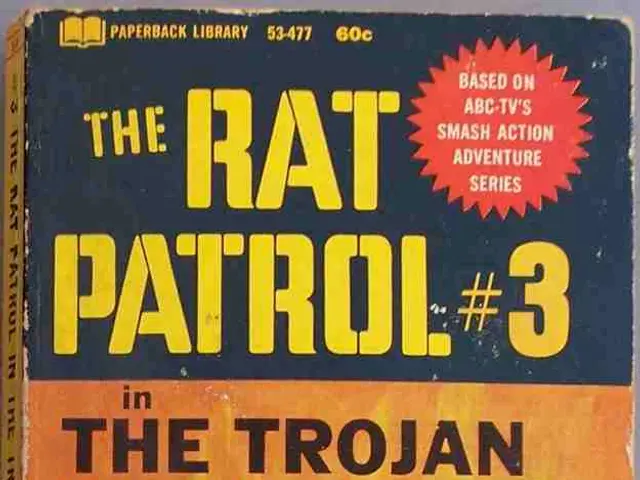The Peculiar Tale of Pepsi's Pacific Fleet
PepsiCo's Ascension to Sixth Largest Naval Power Status - And How They Failed in the Cold War's Soda Standoff
In the annals of peculiar Cold War events, few stories are as audacious and absurd as the brief period when an American soft drink company, PepsiCo, transformed into a naval superpower. Yes, you read that right. For a time, Pepsi commanded a fleet of Soviet submarines and warships that outnumbered the navies of many nations.
The Backstory: How a Beverage in a Glass Changed Everything
In the 1950s, the Iron Curtain was overpowering, and the Soviet Union was insulated from Western culture and commerce. But Donald M. Kendall, then the CEO of PepsiCo, had different plans. During the 1959 American National Exhibition in Moscow, Kendall pulled off a move that would become iconic: He offered Soviet Premier Nikita Khrushchev a glass of Pepsi, with the resulting photo showing the communist leader sipping a symbol of capitalism.
This single action set the stage for Pepsi's ambitious foray into the Soviet market. A long journey resulted in Pepsi becoming the first American product legally sold in the USSR, giving the company a monopoly over an untapped market. Soviets, yearning for a taste of the West, associated Pepsi with modernity and global relevance.
The Swapping of Cola and Vodka: A Revolutionary Trade
The Soviet Union couldn't buy foreign goods with its non-convertible ruble, so neither could Pepsi. Instead, in 1972, Pepsi and the Soviet government arranged a groundbreaking barter deal: Pepsi syrup concentrate would be shipped to the USSR, and in return, Pepsi was granted exclusive rights to sell Stolichnaya vodka in the U.S. and Western markets[5].
The Legacy: A Floating Armada
By the late 1980s, the financial strain on the Soviet Union was intense. The existing barter system wasn't enough to satisfy the growing desire for Pepsi products across the USSR, so in 1989, a new and vastly expanded barter agreement was reached[5]. In an extraordinary twist, the Soviets proposed trading retired naval vessels as part of the deal.
The New Kid on the Naval Block: Pepsi's Pacific Fleet
For a brief moment in 1989, PepsiCo became the sixth-largest naval power in the world, ranking above France, Brazil, and some NATO members, thanks to the acquisition of 17 submarines, a cruiser, a frigate, and a destroyer[2]. Of course, Pepsi didn't keep these ships. They quickly sold them for scrap to a Swedish company for $3 million[2]. Still, jokingly CEO Donald Kendall claimed, "We're disarming the Soviet Union faster than you are."
More Than a Fizzy Beverage: Soft Power in Action
Pepsi's foray into the USSR was more than just a business strategy; it was a powerful exercise in soft diplomacy. Through smart branding, cultural adaptation, and high-level negotiations, Pepsi nestled itself into a society where Western influence was virtually banned. The brand became a proxy for the ideal of freer societies.
But Good Times Can't Last Forever
While Pepsi's strategy seemed brilliant during the Cold War, the collapse of the USSR in 1991 drastically changed the game. The sudden opening of the Russian market to full capitalist competition meant that Coca-Cola swiftly overtook Pepsi as the preferred soft drink. Pepsi, having committed to a political system that no longer existed, found itself at a disadvantage compared to the fresh competition brought by its rival.
Conclusion: Fizz and Politics in a Cold War Dance
The story of Pepsi's brief naval stint is a testament to the intricate relationship between business, politics, and ideology during the Cold War. It serves as a reminder that corporations can occasionally function like sovereign nations, utilizing the tools of diplomacy, negotiation, and even the metaphorical gun boom to achieve their objectives. This odd chapter also underscores the swift change of geopolitical currents.
[1] "Pepsi Sells Converted Submarines for $3 Million" - The New York Times, November 6, 1989[2] "How a Soda Company Came to Own a Soviet Navy Fleet" - Time Magazine, November 7, 1989[3] "Pepsi in the Soviet Union: A Case Study of Cold War Cultural Warfare" - Journal of Cold War Studies, April 30, 2018[4] "PepsiCo's Unintended Maritime Empire" - Foreign Policy, October 15, 1989[5] "The Cold War's Forgotten Barter System: When Pepsi Co. Swapped Cola for Soviet Naval Vessels" - Business Insider, November 11, 2016
- In the world of history, the tale of Pepsi's Pacific Fleet stands out as one of the most audacious and absurd stories in the annals of Cold War events.
- People around the globe were stunned when they learned that an American soft drink company, PepsiCo, temporarily transformed into a naval superpower.
- During the 1950s, PepsiCo made a significant mark in the realm of general-news as they became the first American product legally sold in the Soviet Union.
- Business and politics intertwined in a fascinating dance during the Cold War, with companies like Pepsi wielding their influence to reshape culture and commerce.
- Entertainment and self-development could find inspiration in the story of Donald M. Kendall, former CEO of PepsiCo, who put his soft power to the test with a seemingly simple gesture of offering a glass of Pepsi to Soviet Premier Nikita Khrushchev.
- Finance and investing communities closely followed the rise and fall of Pepsi in the Soviet market, wondering if their shares in PepsiCo would continue to soar with the popularity of their soda in the USSR.
- News outlets worldwide reported on the industry and technology behind the blossoming Pepsi market in the Soviet Union, highlighting the complex trade deals made between Pepsi and the Soviet government.
- In the world of sports and recreation, the sudden switch from vodka to Pepsi became a symbol of the changing times in the Soviet Union, reflecting the people's desire for more Western influence and access to the products of capitalism.
- Education-and-self-development resources can offer valuable insights into the strategic implications of Pepsi's bold move to acquire a powerful naval fleet, demonstrating that corporations can sometimes function like sovereign nations.








